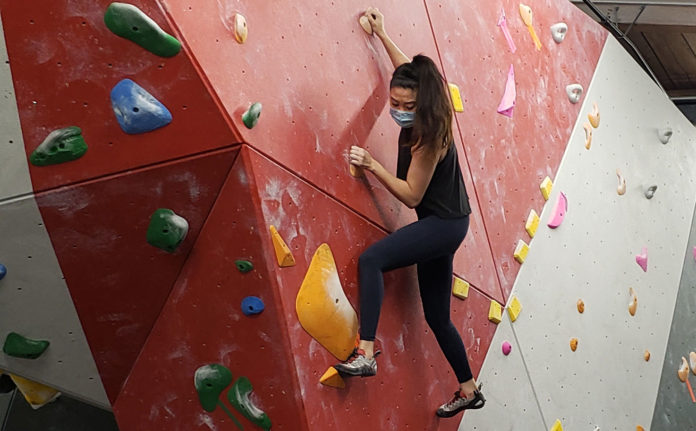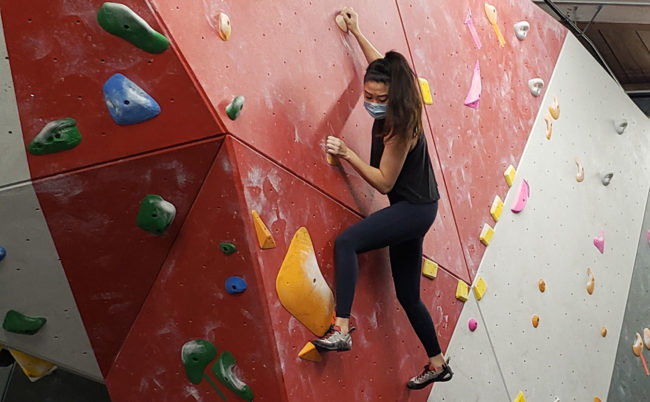
By John Burgman
One of the most noticeable safety protocols in response to the ongoing COVID pandemic for many reopened gyms is requesting that members wear facemasks while climbing or belaying—or in some cases while doing anything inside the facility. In fact, for some gyms, the facemask protocol is not merely a request; it is a required mandate by local or state authorities.
Wearing a facemask inside a gym sounds like a fairly straightforward protocol, but the request can prompt questions from some members about facemasks’ effectiveness against the spread of COVID. And the concept of a required facemask can be perceived by some as an infringement on personal liberties.
These are all challenges that Matt Lambert, owner of Rogue Rock Gym in Medford, Oregon, has personally had to deal with for weeks since he reopened his gym after a temporary closure. Lambert says that most of the members have complied with his gym’s enforcement of the state’s mandatory mask requirement, but there are a few who have not. “Climbers are an independent bunch, especially the younger generation,” says Lambert. “They think it’s all a big hoax or whatever and it doesn’t affect them and they really don’t care about masks. I don’t know what to do about that.”
Lambert offers some context, noting that Jackson County (where Rogue Rock Gym is located) has seen only 178 documented cases of COVID amid a total population of approximately 220,000 people. The gym members who repeatedly disregard the gym’s mask requirement tend to be the “regulars” who frequent the gym several nights per week—and stay until closing time—and consider the facility almost like a second home. Lambert greatly values such loyalty, but says, “Those people love the gym and community, but they feel in a way like it’s ‘their gym’ and they can do whatever they want.”
Lambert has found some success in approaching the matter with kindness, simply asking members to accept the gym’s required mask policy and letting them know he “hates having to be the mask police.” But the issue has grown more serious recently, with some staff at Rogue Rock Gym being yelled at or “intentionally coughed on” by members who object to the mask requirement. Lambert made a post in the Climbing Gym Operators Facebook group asking for advice on enforcing mask policies. At this point, in order to protect his gym staff, he is even prepared to temporarily close his gym (again) because some members refuse to follow the mask requirement. “I don’t know what the right answer is,” he says. “It’s infuriating. I feel personally disrespected by people not wearing the mask, and I feel they are being disrespectful to others in the gym.”
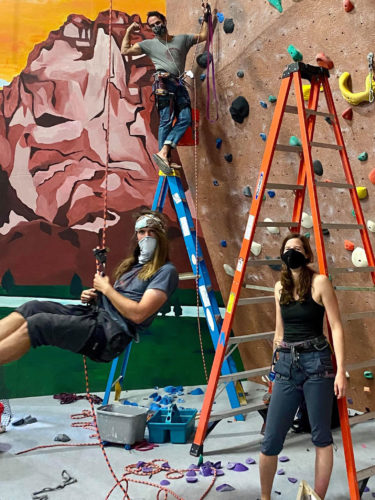
Adopt a “Three Strikes and You’re Out” Policy
Gyms around North America are dealing with customers’ adjustment to facemask protocols in various ways. One approach that has been successful for several gyms is the concept of members getting a finite number of chances to comply with the facemask policy. And those chances have increasing consequences. For example, Jesse Waldorf, co-founder of Strait Up Climbing in British Columbia, has recently reopened his gym with a mandatory mask policy that utilizes a three strikes approach for discipline: First, customers who choose to not wear masks will get a verbal warning, then they will get a written warning, and finally those who still refuse to wear masks will receive a week-long suspension from the gym.
“The three strikes thing is something we have adopted for all non-life-safety violations in the gym,” Waldorf tells CBJ. “Similar warnings would be given at our facility for being shirtless, taking food into the gym [as the removal of snacks and beverages is yet another COVID safety protocol], or horseplay/running, in juxtaposition to something like a belay safety violation—which would prompt an immediate incident investigation, potential revocation of belay certification, and other actions.”
Waldorf notes that the community around the gym has only had eight positive COVID cases—partly due to the community taking the matter very seriously. This made the decision to require masks at climbing gyms in the region “a bit easier.” But Waldorf realizes there will likely be a learning curve as Strait Up’s members get used to the requirement, the new normal of having to climb with facemasks. “We feel the three strikes is a reasonable procedure to allow people to adjust,” he adds. [Note: Waldorf’s mother has also played a part, joining a local group—Mask Making on the Sunshine Coast—that hand-sews masks for anyone in the region who needs them.]
Jason Groves, owner and manager at Ozark Climbing Gym in Springdale, Arkansas, says he has not had any issues related to members and facemasks, so Ozark does not possess any formal mask enforcement policy. However, Groves says he would likely use a comparable three-tiered warning system if members’ refusal to wear masks ever became an issue at his gym.
Approaching the customers with a couple warnings softens the sternness—at least at first—while also conveying some necessary strictness. And being firm is important, as Matt Lambert at Rogue Rock Gym has noticed that some people do not accept the seriousness of the matter when first confronted about a facemask infraction. Lambert says that people tend to respond with a lighthearted quip along the lines of “Uh oh, I’m busted” or “Ya got me!” So, giving multiple warnings helps amplify how serious a gym is taking the facemask matter.
The seriousness of the issue can’t be understated; for many people, COVID is life threatening like belay safety violations. At The Spot, which has gyms in Boulder and Denver, Colorado, customers and members have been a natural first line of defense, with peer culture playing a significant part in mask enforcement. “When your fellow climber asks you to put your mask on properly, it’s more powerful than our staff asking. We are fortunate that our community cares enough to speak up,” according to Josh Paton, facility manager at The Spot. To reinforce their policy, regular announcements are made that include the statement “we all thank you for wearing your mask properly”.
Despite the cordial approach, an occasional “anti-mask” visitor from out of town has made the situation difficult by abusing the policy to make their point. In one rare case, the visitor became belligerent, and like any time when customers are acting very poorly and refusing to leave, the police were notified. (Fortunately the problematic customer left of their own accord.) Josh explained, “We hated to do that, but wearing masks is incredibly important in our community. It’s one of the reasons we can be open.”
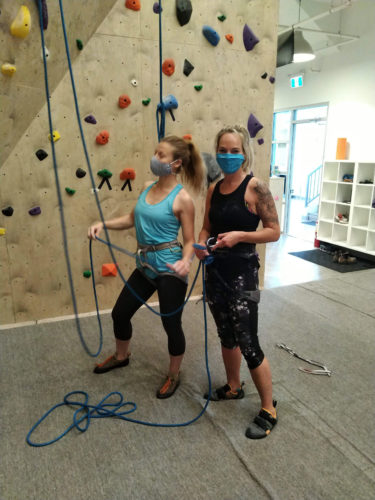
Train Staff on De-Escalating Conflict
Gyms in larger markets—and in some cases markets hit harder by the COVID crisis—have adopted a comparable approach. Grace Nicholas is CMO/COO and co-founder of Crux Climbing Center in Austin, Texas, a state with a COVID positivity rate of nearly 15 percent as of July 20 (although, it should be noted that that positivity rate was the lowest for the state in more than a week). Nicholas says that Crux has required masks since reopening, and having such an unchanging mask policy has helped with compliance. Crux also has many signs posted throughout the gym reminding customers of the requirement. “Our staff will alert anyone if their mask isn’t worn properly when they are on their standard lifeguard routine,” explains Nicholas. “If someone has to be told more than twice, then we will ask them to join us another time when they are able to comply with the mask policy.”
Nicholas says that Crux takes a “benefit of the doubt approach” for those first two reminders about wearing masks. In cases where customers intentionally or inadvertently remove a mask during a climbing session, a Crux staff member will use gentle prompts (such as “Oh, it looks like your mask slipped down,” or simply, “Can you please pull your mask up?”). The analogy to lifeguarding at a pool is apt, as Nicholas notes that a staff member’s gentle gesture from far away can also work as a prompt in a climbing gym. CWA recently released a useful piece on de-escalating customer conflicts, so misunderstandings and discouragement don’t swell into larger issues. Staying conscious of tone and body language as well as practicing empathy were among the strategies listed.
Nicholas adds, “If someone comments about how hot or uncomfortable [masks] are, we advise our staff to take a positive approach like, ‘Sure, but now I’m much more aware of my breathing while climbing.’ [or] ‘It’s a little like alpine training,’…[or] ‘Yes, the sooner we all wear these correctly, the sooner none of us will have to wear them anymore.”
Be Aware of Special Circumstances
It is important for gym owners to know that even something as seemingly straightforward as a mask policy is rife with nuance.
Some medical conditions, such as severe asthma, autism, and sensory issues make wearing (and breathing through) a mask difficult—even dangerous—for some climbers. In essence, the well-intended facemask protocol to combat COVID’s spread could end up being more dangerous for some gym members in the immediate sense. It is worth noting that there are modified face coverings that can be used to accommodate some medical issues, although whether or not gym members can acquire such masks is a different matter.
Waldorf points out that those climbers who cannot reasonably wear masks at Strait Up in British Columbia will be accommodated, and exceptions will be made as needed to his gym’s facemask requirement. “We plan to address these on a case-by-case basis the way we would handle any adaptive climbing situation where a practice is in conflict with a normal procedure,” Waldorf says.
CBJ Legal Analyst Jason Pill notes that gym owners usually cannot legally ask for proof of a member’s medical condition, which admittedly leaves room for some members to potentially be dishonest about the need for a mask exception. “Climbing gyms should avoid asking climbers for medical information and, really, gyms do not need proof of the climber’s underlying medical condition—only a doctor’s note explaining the limitation or restriction; the actual diagnosis is irrelevant,” Pill explains.
Medical exemptions aside, Pill, a longtime climber and an attorney for the Phelps Dunbar law firm in Florida, says that a gym does generally have the legal right to deny service to a customer who is not wearing a mask. A gym, as private property, can remove non-compliant customers in the same spirit of the old adage: No Shirt, No Shoes, No service.
Pill points out that there is a degree of mutual choice in the scenario: Gyms can refuse customers, and alternatively, customers can choose which establishments they patronize. For that reason, the idea of any Constitutional violation of rights is mostly moot because “a customer can exercise his or her rights by not frequenting that gym if he or she disagrees with the gym’s policy,” Pill says.
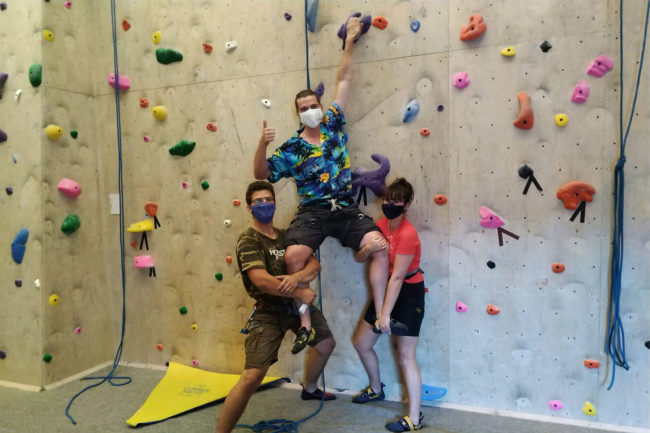
Frame the Logic and Explain the “Top-Down” Situation
Most climbers at any gym are aware that recommended protocols have been released by health authorities like the Center for Disease Control that reside beyond the climbing gym industry. The mitigation advice thus comes from the top-down, only being applied to a climbing gym setting after being sifted through medical professionals and other industries.
Lambert at Rogue Rock Gym says that acknowledging such higher-up nature of the safety protocols can aid with customers’ understanding and acceptance. For instance, when Lambert approaches customers who are not wearing masks, he is quick to point out that the discussion at hand is not whether facemasks are effective or whether facemasks infringe on one’s liberty. Instead, the discussion at hand is about the customer helping the gym adhere to a mandate that the state of Oregon has made.
Lambert often explains to customers that he, himself—as an honest business owner—is simply trying to follow the rules. Lambert also tells customers that he is trying to adhere to the state’s mask mandate just as he adheres to all other state mandates—properly and conscientiously. “I ask members to please have my back and support me in this,” he says. “Often it works.”
Consider Selling Gym-Branded Masks
Still, not every state has been requiring customers to wear masks inside businesses, leaving many gyms to rely on their own ingenuity to build solidarity around wearing masks. Another new industry development resulting from the ongoing pandemic has been the rise of a micro-industry for facemask production. A number of gyms have seen customers’ need for masks and decided to sell masks as another retail item, alongside longtime staples like athletic tape and gym logo t-shirts. Selling masks at the counter prevents irritation from boiling over when customers realize they forgot their mask at home. Plus, adding your own style or branding can help counteract any negative stigma with the positive force of group pride. And since wearing masks has become a new normal, might as well look cool doing it.
EVO Rock + Fitness in Portland, Maine, is selling a neck gaiter for $15 which “makes a great face mask,” according to the gym’s website. The gym notes that it is following Portland Public School, CDC and Maine governmental recommendations for COVID mitigation. In nearby Massachusetts and Rhode Island, Rock Spot Climbing is selling a limited supply of branded masks with a mountain background and its company logo.
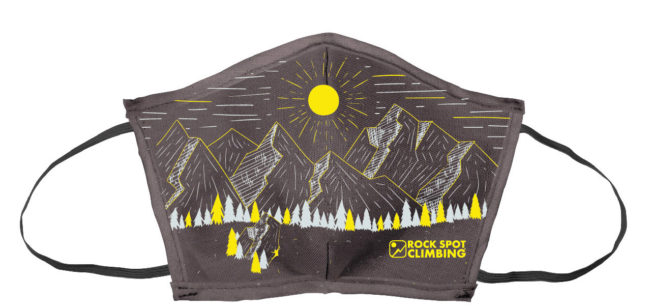
The trend is not only taking hold in the U.S. either. In Canada, Le Crux in Québec is selling a mask branded with the gym’s logo as well. The Hive in Vancouver is also selling a limited supply of masks, in addition to holding a free digital workshop on “breathing techniques with a mask.” In South America, Escalada Realization has helped encourage its climbers to wear masks during quarantine and feel part of the gym community from afar by offering branded masks when its members make a contribution.
On a related note, a few members of the youth climbing team at Climb Nashville recently created a tutorial on how to make masks of bandanas (branded with the Climb Nashville logo). The CDC has released its own tutorial on making face coverings. [Note: In some places there are certain requirements for what constitutes a mask, so just be sure to follow the guidelines for your area.]
In terms of other climbing industry brands, St. Louis, Missouri-based So iLL has released masks that retail for $26.99. On Instagram, Dirtbaggers and Static Climbing have both been promoting facemasks geared toward climbers. “For each mask sold, we will donate a mask to someone in need,” Static Climbing noted on its website. And according to the Dirtbaggers website, “Dirtbaggers always strives to source materials ethically, pay fair wages, minimize their environmental impact, and maintain relationships only with businesses that align with their values,” ideas which resonate with many people in the climbing community.
Crux Climbing Center has noticed a positive change in compliance since selling the Dirtbaggers mask. “We’ve sold over 300 of them, and now non-members come in to buy them for their work after they have heard about them from one of our climbers,” says Grace Nicholas. “Providing an option that people want to wear helps to have more people comply.”
Note: The statements in this article are not intended to be used as direct legal counsel. Gym owners should always consult a lawyer for any legal matters.

John Burgman is the author of High Drama, a book that chronicles the history of American competition climbing. He is a Fulbright journalism grant recipient and a former magazine editor. He holds a master’s degree from New York University and bachelor’s degree from Miami University. In addition to writing, he coaches a youth bouldering team. Follow him on Twitter @John_Burgman and Instagram @jbclimbs. Read our interview Meet John Burgman, U.S. Comp Climbing’s Top Journalist.



